If you were asked to rate your satisfaction with your thyroid treatment on a scale of 1 to 10 with 10 being the best and 1 being the worst, where would you fall?
Depending on how you answer, you may or may not be surprised at where roughly 12,000 thyroid patients put themselves on that scale.
In an online survey of over 12,000 thyroid patients on thyroid medication, the average satisfaction of thyroid patients was 5 out of 10.
That’s 50% if we were giving thyroid management a grade! In other words, a failure or an “F”.
If you are new here then this number may surprise you, but if you’ve been around for a while you probably aren’t surprised at all.
Today we are going to break down this survey and help you understand why thyroid patients are so unsatisfied with their current treatment.
We will also talk about this online survey, what information you should take away from it, and what steps you should take going forward.
By the way, if you want to see the study in its entirety you can find it here (1).
Patients Give Doctors a “5 out of 10” for Satisfaction + Major Takeaways
As a thyroid patient, you should be aware of the struggles that both YOU and your fellow thyroid patients suffer from.
I’m always amazed to find that so many thyroid patients feel that they are alone in how they feel or that they are made to feel crazy by their doctor when they report feeling unwell.
The good news is that you are NOT alone and that 12,000 other thyroid patients probably are experiencing something similar to you.
The bad news is that this is a very real problem and one that must be addressed.
This survey is a step in the right direction simply because it brings awareness to the problem that many have known existed for quite some time.
But it doesn’t excuse the lack of treatment that thyroid patients face.
While it is important that most thyroid patients feel dissatisfied with their current treatment, there is also a lot of additional information we can glean from this online survey.

Here are a couple of very important hot takes from this survey of 12,000 people:
- 62% of people who responded to the survey were taking T4-only thyroid medications like levothyroxine and Synthroid.
- 41% of respondents have been receiving thyroid treatment for 10 years or MORE
- 43% of respondents suffer from hypothyroidism from Hashimoto’s thyroiditis (the #1 cause of hypothyroidism in most developed countries)
- The overall satisfaction among thyroid patients receiving treatment for their hypothyroidism is 5 out of 10
- 69% of respondents suffer from weight management issues (which is a major cause of their dissatisfaction)
- 77% of respondents suffer from fatigue or low energy (which is a major cause of their dissatisfaction)
- Thyroid patients rate the need for new thyroid therapies as a 10 out of 10 (more information on why this is wrong below!)
The most staggering statistic up there is the fact that 41% of thyroid patients have been experiencing their symptoms for 10 years or MORE!
This is an unacceptable number because there are absolutely better treatments available that can help ease the symptoms of hypothyroidism dramatically.
And these are therapies and medications that YOU as a thyroid patient will need to be aware of because you can’t count on your doctor to know them.
A Clear Preference for Natural Desiccated Thyroid Medication Shows Up… Again
This isn’t the first study to come out showing the dissatisfaction of thyroid patients with their treatment and it certainly won’t be the last.
I’ve written about the last one which you can read about here if you want to see that this isn’t an isolated event.
But here I want to break down a finding which seems to emerge in each of these surveys.
In this survey, and in other surveys, there seems to be a distinct and obvious preference among thyroid patients for the type of treatment that they receive.
I already mentioned that the average satisfaction among thyroid patients receiving thyroid treatment is 5 out of 10 but I didn’t break that down by type of therapy.
It turns out that the 5 out of 10 satisfaction score was for patients who were taking T4-only thyroid medications such as levothyroxine and Synthroid.
But what happens when we separate those people from patients taking other types of thyroid medications?
We get some different results:
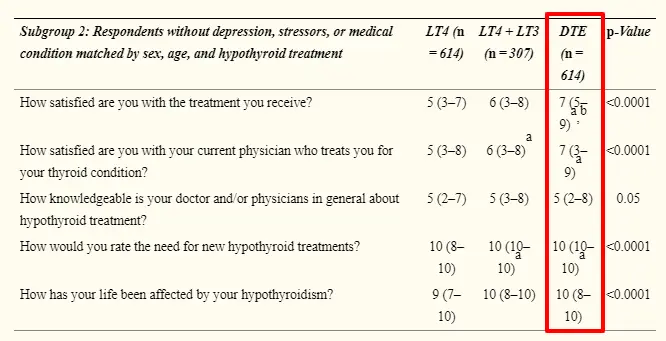
- Patients taking NDT formulations (29% of the people who responded) had a satisfaction rate of 7 out of 10.
- Patients taking T4 and T3 combinations had a satisfaction score of 6 out of 10.
- Patients taking NDT were less likely to report problems with weight, energy levels, mood, and memory compared to those on T4-only medications.
Why is this surprising?
Well, for a couple of reasons that you should be aware of.
The first is that the problem with thyroid management is not that we don’t have the right treatments, it’s just that doctors are providing the wrong medication.
The second is that doctors have a clear preference for using medications that don’t work as well as others and that they either aren’t willing to prescribe different medications or they are ignoring the symptoms that thyroid patients present with.
Both reasons are equally disturbing and they are things that you should be aware of.
Another important takeaway is that patients who use any thyroid medication that contains the active thyroid hormone T3 have greater satisfaction than those not on T3.

T3, for those that don’t know, is the most powerful thyroid hormone in your body and it is available as a prescription medication for thyroid patients.
But despite its availability, doctors rarely ever prescribe it.
Many people might read the results of this study and conclude that Natural Desiccated Thyroid is the best thyroid medication available but I think that misses the mark.
While NDT formulations are great for thyroid patients, you can still get amazing results using any form of T3 medication.
After one or two studies (2) you can say that it’s just a coincidence that patients prefer medications such as NDT over levothyroxine and Synthroid.
But when you start to see the studies that show this connection over and over again, it starts to become a trend that you can’t ignore.
As a thyroid patient, you should be aware that you have A LOT to gain by switching to a thyroid medication that contains T3!
You can do this by either adding T3 medications to your existing T4 dose or by simply switching to a formulation of Natural Desiccated Thyroid hormone.
Problems with the Study
This is definitely a study that you will want to bookmark and hang on to as ammunition that you can bring to your doctor if necessary but you should also be aware of some of its flaws.
Every study has some flaws which means that they aren’t perfect, but just because they are imperfect doesn’t mean that their information is useless.
You should be aware of these flaws just in case you get any pushback from your doctor when you show him/her the results.
Problems with the study include:
- It is an online survey/study – Online surveys are not as regulated as other forms of acquiring information (such as blood tests) so they are not often taken as seriously. But they do function to get researchers interested in topics and to help guide further and future research.
- More women than men were included compared to the regular thyroid population – Roughly 80% of all thyroid patients are women but, in this study, women represented 96% of all respondents. What this means is that the survey results are not a perfect representation of the thyroid population as a whole but they can definitely be used as a close mirror of what is happening to most WOMEN who have thyroid conditions.
- More people in the survey were using NDT compared to the regular thyroid population – The results found that approximately 29% of those people who responded to this survey were using NDT formulations (natural desiccated thyroid) as their thyroid medication. This is much higher than the regular thyroid population in which less than 10% of all thyroid patients use NDT instead of levothyroxine/Synthroid.
- The results/findings were self-reported – Usually, when it comes to studies, doctors like to look at objective results/findings. For instance, it’s often better to look at something measurable such as your body weight or BMI if you want to know if people are losing weight. Subjective findings such as “how are you feeling” are really hard to measure and vary from person to person. So, it could be argued that 100 people could all have different answers for how “satisfied” they are with their thyroid treatment depending on what is important to them. One person’s dissatisfaction could be another person’s satisfaction, so to speak. This doesn’t negate the findings but it should be taken into account.
But here’s the rub:
Even though the study wasn’t perfect it doesn’t mean that the results would be any more favorable if the problems above were tweaked/fixed.
For instance, consider a few of these examples.
The first is the idea that the study wasn’t a representation of the general thyroid population because it included a high percentage of women.
This is important because women tend to suffer from more severe thyroid symptoms compared to men, even with comparable lab tests.
Men have a higher density of T3 receptors on their cells which means they can tolerate a lower level of thyroid hormone compared to women.
So this study, while it contains more women than men, is probably more reflective of the satisfaction of WOMEN who have thyroid disease (and not both genders).
Another important point is the percentage of people who were already using NDT thyroid medication in the study.
The total number of thyroid patients using NDT in the general thyroid population is less than 10% while the number of people using NDT formulations in this study was 29%.
I believe that the reason we see a higher percentage of people using NDT has to do with the fact that these patients are savvier than the average thyroid patient, have probably spent more time on online blogs, and are more aware of the types of therapies available to thyroid patients.
These patients would naturally be more inclined to fill out a survey or even be aware that a survey for thyroid patients was taking place.
If you consider that NDT is superior in terms of how it impacts the body with thyroid medication AND that a higher percentage of people surveyed here were on this type of medication, we can assume that the satisfaction among thyroid patients, in general, is probably much lower than the 5 out of 10 reported.
Again, these are not huge problems with the study but they do mean that the results are probably not 100% reflective of the general thyroid population as a whole (though I do believe it is fairly close).
What it means for You
Here’s the biggest problem with the study, from the perspective of thyroid patients:
Thyroid patients wrongly believe that the problem with how they are feeling is due to the fact that there aren’t enough ways to treat hypothyroidism.
These patients said that they believe that new treatments are needed so that they can feel better.
But there’s one big problem with this statement:
The problem isn’t with the treatments but with the DOCTORS!
The doctors are the ones who are not providing you with the right treatment even though they ALREADY EXIST.
There are no fewer than 4 different types of thyroid medications:
- T4-only thyroid medications
- NDT thyroid medications
- T3-only thyroid medications
- Customized and compounded T4 + T3 medications
But guess which therapy doctors use almost exclusively?
Only medications from the first group of T4 only thyroid medication, which includes medications such as levothyroxine and Synthroid.
When was the last time that your doctor recommended any of the following thyroid medications?
- Cytomel
- Liothyronine
- Armour Thyroid
- NP Thyroid
- WP Thyroid
- Naturethroid
- Sustained Release T3
- Tirosint/Tirosint-Sol
All of these medications already exist and can be used safely by thyroid patients.
The problem is not that they don’t exist but that your doctor either doesn’t know that they exist or isn’t willing to prescribe them!
We can’t blame the problem of patient dissatisfaction on a lack of thyroid therapies until doctors are actually ready to start using the other therapies and medications that already exist.
And, by the way, these therapies are far better than the standard levothyroxine/Synthroid medications that your doctor wants to give you.
The medications listed above are often much cleaner (meaning they have fewer ingredients) and many contain the active thyroid hormone T3.
Final Thoughts
This survey is just another in a growing list of online surveys and studies that show one important thing:
Doctors are consistently failing thyroid patients.
Despite taking their treatments faithfully, thyroid patients continue to experience symptoms such as fatigue, weight gain, hair loss, and mood problems.
And these symptoms ALL correlate with symptoms found in a hypothyroid state (meaning they should go away if these patients were properly treated).
Thyroid patients have been getting ignored for decades but there is a growing body of literature that is showing that the current thyroid treatment paradigm must change soon.
The main reason I have this website and blog is to try and encourage this change to happen sooner rather than later.
I have case studies and hundreds of articles that outline how thyroid cases are being mismanaged and what you can do as a patient to feel better.
Help me get this message out by sharing this post so more thyroid patients can see it.
And now I want to hear from you:
How would you rate your current satisfaction on a scale of 1 to 10?
What type of thyroid medication are you currently using?
Do you agree with the results of the study? Why or why not?
Do you believe that we need new thyroid medications/therapies?
Leave your comments or questions below!
Scientific References
#1. https://www.ncbi.nlm.nih.gov/pmc/articles/PMC6916129/
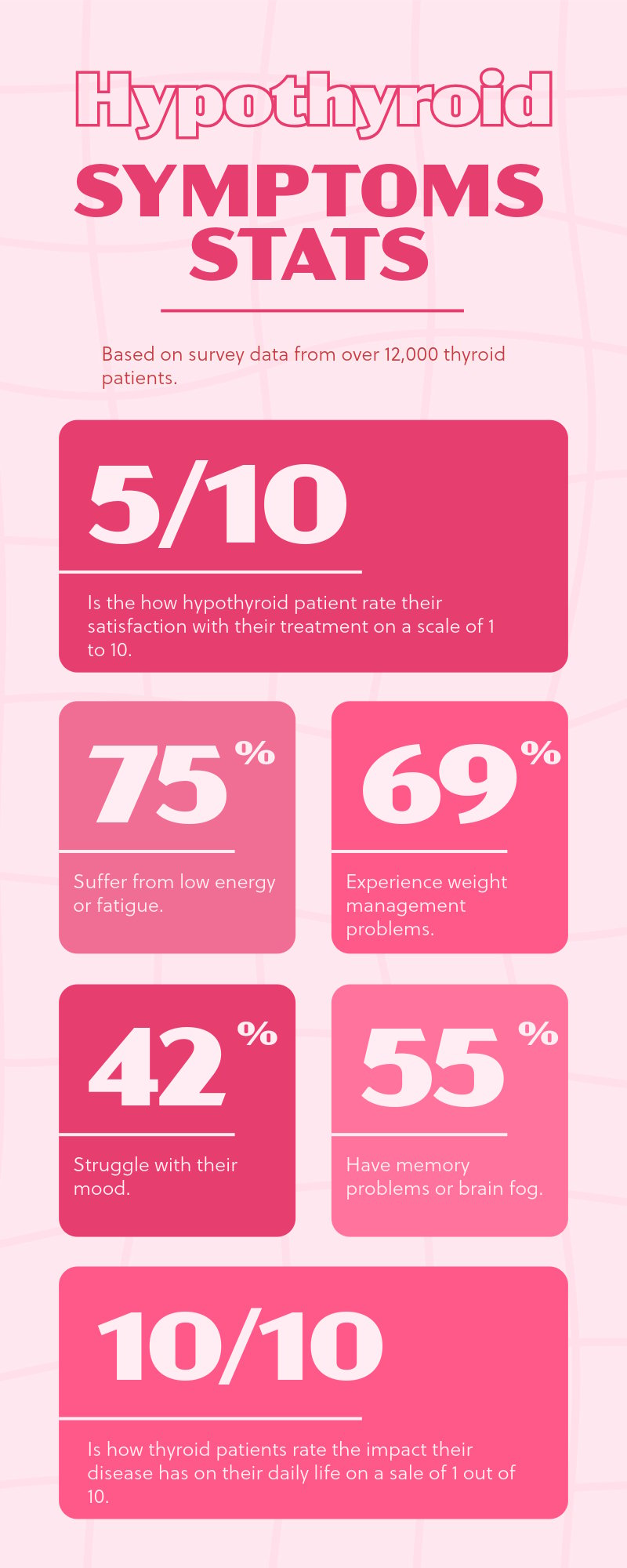
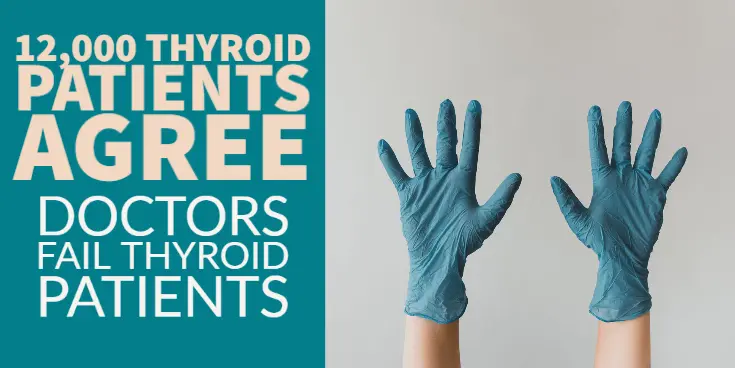
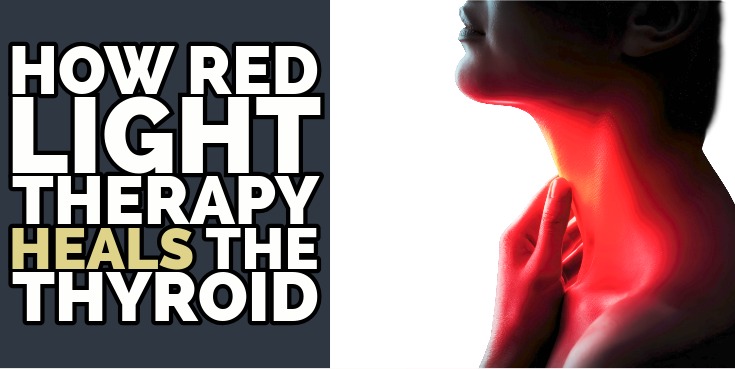
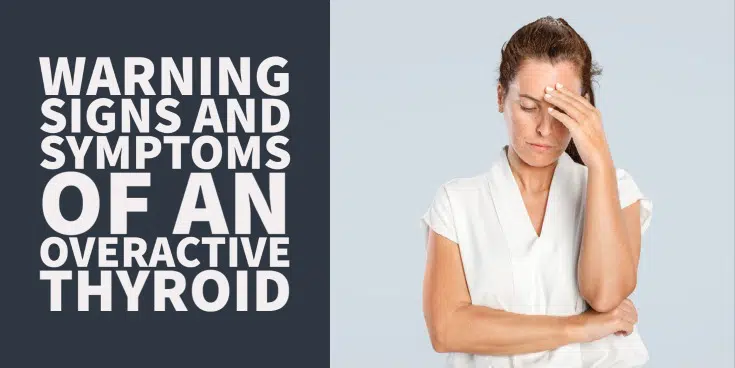
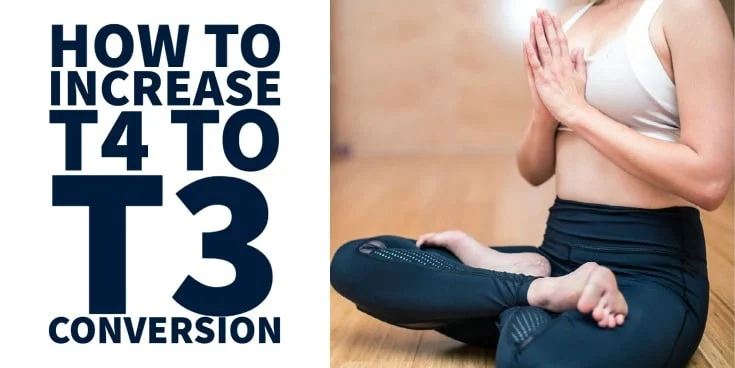

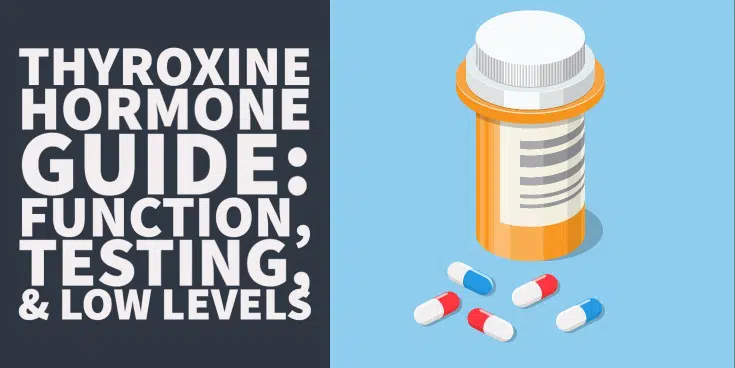
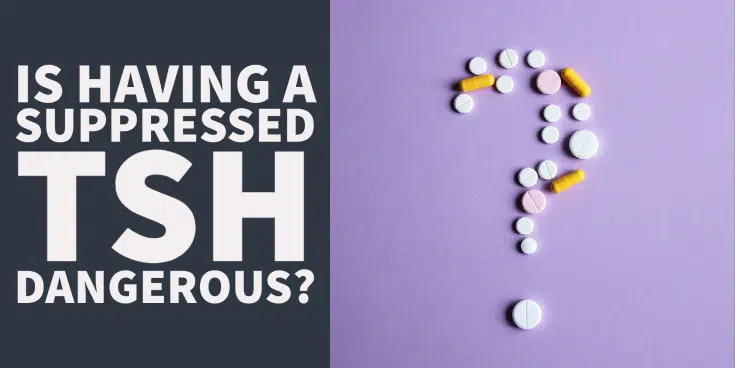

I would have to rate my satisfaction as a 4. Even though my doctor tends to be open minded, she’s still stuck on the TSH.
I have been on NP Thyroid for a few years, until Acella changed the source of the pig thyroid. I know they changed it because I spoke with someone at the company.
I was feeling really tired and achy. I switched to Thyrogold with is a bovine thyroid supplement sourced from New Zealand. I have also added Cynomel (T3) from Mexico. All because my doctor wouldn’t increase my meds. I still haven’t found the correct dose but working on it.
From what I have read, at one point all these NDT’s were great but eventually they all went downhill. I’m not one of those conspiracy theorist people, who likes to go on about Big Pharma…. But I do know companies like to make more money so the trend these days is to outsource. They outsource for cheaper products/parts/employees etc. There is the old saying ‘You get what you paid for’.
What we need is to get these pharmaceuticals to stop changing the way they make the meds so they can make more money off it.
Hi Susan,
I think the formulation changes stem from the idea that only the active ingredients matter. Because the active ingredients still remain unchanged in NDT formulations but the inactive ingredients are the things changing (presumably to cut costs or increase profit margins). These changes to the inactive ingredients are probably what accounts for the changes in efficacy that some people are experiencing.
Having said that, the medications still work for many people so they still have value.
Us Pharmacopei added Lactose Monohydrate to all NDT after the shortage in 2017, the new formula is noted on the WP RLC website. You will find the statement under Additional ingredients, while RLC did not change their formula, USpharmacopea has. I have yet to find any NTD in The United States that does not contain it. Sad as it triggers my Narcolepsy and I have been Stimulant free since going Gluten and Lactose free in 2008. Now, my life has lost the quality I once enjoyed using the old formula without the tainted addition of Lactose Monohydrate. This is unacceptable, yet not one Doctor will listen. I don’t do well on Synthroid or synthetic thyroid, even if it’s Gluten and Lactose free. I do not wish to go back on Ritalin or another stimulant in order to live and drive!
Hi Ann,
I haven’t been able to confirm that all NDT formulations contain lactose but you are certainly right that both WP thyroid and Nature thyroid do. Where did you find that the other formulations do? In regards to improving your symptoms, you can still use compounded T4 and T3 formulations which are much cleaner than the standard big box pharmacy formulations.
I would rate my level a 1. I have been on synthroid since I am 1o years old (My grandmother had hashimotos so maybe hereditary, I also had strep throat a lot when younger so maybe from that?)
I have had two children and both times post partum my TSH has gone down to 0.01. (one doctor took me off for 3 months post and my TSH went up to 19!)
No doctor is willing to do anything but continue to test my TSH and alter my synthroid levels from 88mcg to 50 mcg every 6-8 weeks.
I have to ask doctors to test my T3/T4 but they still do not do anything when we test them and only look to fix the TSH.
I am still feeling symptoms and can not loose weight/weight stays stagnant and am always tired/hair falling out low heart rate, etc. and they always say probably due to post partum…
I eat completely clean, do yoga/pilates/walking 5-6x a week and should be able to easily loose the weight/not feel tired (i sleep 6-8 hrs a night)
Do you know any doctors you would recommend in Austin TX? I am finally ready to take this into my own hands. :/
Hi Shelley,
Unfortunately, I don’t know anyone in that area to recommend but you can use this resource which teaches you tricks to help you find a local doctor: https://www.restartmed.com/thyroid-doctor/
I would rate my thyroid treatment with a 7. My GYN started doing bHRT a couple years ago and I got a full lab panel done. Unfortunately, I don’t think they knew much about the thyroid tests they ordered. All of the tests were put into a computer system and it told them what they should put me on and how much bHRT to use. I was out on Armour Thyroid right out of the gates, but the pharmacy gave me generic NP Thyroid. Listening to your podcasts, I didn’t put up a big fight. My levels are: TSH 0.78, T4: 6.2, FT3: 3.4, RT3: 16.8, TPA: 1.4. I have been taking your thyroid supplements and T3 conversion booster, but I’m wondering if my T3 is getting too high. I also never had above a 0.1 TPA level except for the last year and now it’s rising. My weight has gone up about 10lbs in the last year as well, and I just can’t lose any weight. I exercise daily and eat (pretty) clean.
I am interested though on your thoughts on the sex hormones and how they interact w thyroid levels.
Thank you so much for all of your content and podcasts. I have a long commute and listen to you all the time!
Just to add: I’m 47yo, 156lbs and 5’8”. I did start getting testosterone bHRT pellets at the time I started my thyroid meds.
Hi Nicol,
You only need to worry about your free T3 if you have symptoms of hyperthyroidism. Otherwise, it’s not that big of a deal.
I developed Hashimoto’s 6 years ago after the birth of my 3rd child. I knew right away that something wasn’t right. My weight wasn’t coming off like it normally did and I was so tired. I went to my doctor and she basically blew me off and said my blood work was normal except my cholesterol was high( for the first time ever). Now looking at my blood work my free t3 was also below range and she didn’t mention it. I got a new doctor who once again blew me off. For 3 years, I complained about the inability to lose weight and feeling tired. I asked if he could run a full thyroid panel bc I have many symptoms of Hashimoto’s. He told me my Tsh was fine and he would only run the labs that he felt were necessary. I paid and ordered my own lab. I received a phone call from the lab stating that my antibodies were extremely high and I needed to see an endocrinologist. My endocrinologist confirmed that I had Hashimoto’s. I thought this was a good thing and that I would be treated, but 2 endocrinologists later I am still experiencing the lets just run labs every 3 months and prescribe vitamin D. We can’t do anything until your thyroid is destroyed fully. I have had to get an FNA because of nodules. Do you know anyone in Michigan? Or anything that might help? I feel like giving up. I force myself to work our and eat healthy and nothing happens. I often find myself asking what’s the point? I feel like I should just give up at this point and except the extra 25 pounds that I never lost from my pregnancy with my daughter. I want to feel my age (33).
Hi Tisha,
Unfortunately, your story is all too common, and the reason my website exists. You just need to look outside of conventional care and the insurance model and you will get all of the treatment you need. I don’t have any recommendations for that area but this resource can help you find the type of doctor you need: https://www.restartmed.com/thyroid-doctor/
My advice to you is to stay away from any doctor that accepts insurance as they will all treat you the exact same way. Many patients continue to see these doctors (for up to 10 years) before they start looking elsewhere and feeling better.
You can also find more info on why I don’t recommend endocrinologists here: https://www.restartmed.com/endocrinologist-for-thyroid/
Going to an endocrinologist is like going to a robot. Even a general physician isn’t going to be of much help. I saw my GP for several years and even though he ran the full thyroid panel of tests two times a year he didn’t correlate my obvious declining T3 levels to the myriad of debilitating symptoms I was having.
I have a lot of days I’ve wanted to give up and I’ve been dealing with these problems for about four years(on Levothyroxine for 10 years) until I realized what the issue was. It’s been a nightmare trying out different medications too.
My personal advice is to seek out a Dr by doing a google search for Drs that prescribe meds like Nature-throid or NP Thyroid. These Drs will be more open minded to doing alternative therapies and working with you to help you feel better. I am seeing an obgyn that actually prescribes natural desiccated medications and T4/T3 combos and pays attention to the T3 levels. Search obgyns that handle hormones and weight loss because they’re more willing to understand that these imbalances can affect weight and in order to help you lose weight they need to successfully treat your thyroid. The obgyn I see also accepts my insurance. Look at the services provided on their website and you’ll get a better feeling for if they pay more attention to all thyroid levels and not just the TSH.
I’m 67, female, and have been hypothyroid since 2002.
Initially, I went to the Dr. for a blood test (2002) to determine WHY I was so tired all the time. He said my iron count was low. I asked him if he tested for my thyroid, no, did not. After that was done, he said my numbers were so far off, it was a wonder I wasn’t in the emergency room.
So he put me on Levothyroxine, don’t remember the amount but started to feel a little better. After a few months, more lab work, and lots of online research, asked to be put on NDT. He refused, said it wasn’t reliable. After switching doctors a few times, (even when to an Endo – dead end!) found one that agreed to prescribe Armour, then she switched me to NatureThroid. Finally I was beginning to feel like my old self again. Weight no longer a problem, hair not falling out, and energy for days.
Long story short, that doctor retired, and rather than fight doctors again for my NDT Rx, I began to order it out of Thailand, with no Rx. I have felt great ever since, and haven’t seen a doctor or had any blood tests in 15 years. I base it on how I feel, more than what the numbers on a test show. You may disagree as a doctor, but I’ve felt really great! I take 2 subliminal in the AM, and one subliminal in the PM before bed, total of 180mgs. I tried to back down to 2 per day, adding an OVC bovine supplement (Pure Thyro), but started getting the fatigue again after a couple of months. I’m now back to 3 a day.
When I run out of my supply from Thailand (I have about 2 years supply in the freezer left, and with Covid, harder to get now) I will be going to a Naturopathic doctor that will do the right lab work, and prescribe me the NDT I need. They don’t take insurance, but it beats the headache of dealing with doctors that refuse to listen, or even run the right tests.
I wish I could say the results surprised me, but they sadly don’t. I’m dealing with my current GP considering my thyroid lab results as “normal” when I knew how I felt and disagree. Since finding your site, I’ve learned far more about the thyroid than even my husband who had a full thyroidectomy (thyroid cancer). Because I’ve not been able to see someone outside of insurance, I’m stuck figuring things out on my own. It’s ridiculous how many supplements I’ve added over the past 6 months, but I’m finally feeling almost normal. I don’t have the afternoon crash and feel rested in the morning. Unfortunately, I’m still battling with horrible flare-ups on my lips (much like angular chelitis) and think it’s tied to gluten, so I’m attempting to go gluten free to see if I can get my lips to stop hurting, peeling, and being outright miserable. In the meantime, I’m now 40 and despite a better diet and exercise, I’m unable to shed a pound. My gut is always round and bloated. I’m grateful for teaching online so I’m not forced to wear uncomfortable jeans. It’s been brutal adding 15 pounds since March when I went off my antidepressants that were heavily masking my thyroid issues and Covid started shutting life down. Talk about heavy depression and huge battle to get where I am today. Still a LONG and lonely road ahead.
Response 4. Started on Levothyroxine 75 mg within a month, was changed to 50. The worrying thing is that I was diagnosed also with high blood pressure. I asked about the reaction between these meds.(as I would prefer natural medicine)
I am happy to hear that there are natural medicine out there.
Dear Dr Westin,
I would like to know why I cannot lose weight? I am 5’2”, 57 years old and been dealing with hypothyroidism for over 10 years now. Currently taking Armour Thyroid and 2 of your supplements. I constantly suffer with my sinuses and blurry eyes and inflammation. How can you help me to feel 100% please?
Thank you very much. Gina
Years ago, I convinced my doctor to put me on Armour thyroid because I had researched what to take other than synthroid. He was actually an endocrinologist. At one point, he stopped seeing patients so, I had to find a new doctor. I recently saw via YOUR e-mail, which was sent back in August (?) about the Nature-throid recall, which I had been taking. I panicked until I realized my pharmacy had switched me, without my knowledge, to Armour! I asked the pharmacist about it and he said he didn’t think it was necessary to tell me, basically. I disagree and it makes me angry. Shouldn’t the pharmacy have alerted me to 1. the recall and 2. the change of medication?
I have normal TSH and normal T4, but earlier this year I found out my Free T3 was low. It took years to find out what was wrong with me, because every doctor just checked my TSH and said my thyroid was just fine. After moving to WA earlier this year, I had a new DO Doctor and she really listened to me. Thanks to my wonderful doctor she put me on Cytomel T3 only medication and I feel so much better. I rate it an 8. I agree with everything in the article. I follow you closely.
My diet is still the difficult part, since I read so many conflicting opinions on what to eat and what not to eat. I exercise a couple hours a day and am very athletic, but I worry about long term Medications and what it will do to my system, I am 59.
Should I go see an specialist about my Thyroid? Or keep trusting my PCM? I wonder WHY my thyroid went “bust”? Can it have anything to do to the fact that I had a bad tooth infection under the tooth and finally got that pulled and now get my implant, which also scares me. I know the metal in my mouth can’t be good for my Thyroid health.
What supplements are good for my situation. I take many vitamins and some supplements.
Thank you for your time
I was on WP with fabulous results until this past May when all of a sudden I noticed my weight and energy levels not responding. I called my NP and told her it was as though the stuff had stopped working. We increased the WP to BID. I then read your article about the recall by the manufacturer, notified my CVS(who had no clue of it being suboptimal), notified my nurse practitioner and we switched to synthroid 100mcg and Cytomel 5 mg BID. I feel AAAAHHH Okay but can’t get the weight off again no matter how long I work out. My primary is freaking out that my latest TSH is 0.027 but Freet3 and Freet4 are WNL and I feel fine, not losing hair, no shakes , no rapid heartrate. But there is a difference being back on Synthroid verses Natural dessicated .
I am 65, I’ve been on synthroid since 1980. My thyroid has recently “failed”, so my doctor is trying MORE synthroid first.
Over the years he’s added antidepressant and Ambien (long acting).
I’m at a point I would rather die than feel like I do. And I’m not being dramatic.
I have ALL the symptoms on your page and one doesn’t feel worse than the other so I don’t know what to choose.
Hi Wendy,
I would strongly recommend seeking a second opinion: https://www.restartmed.com/how-to-find-a-doctor-to-treat-your-thyroid/
Dr. Childs have you ever heard of an itchy anal excretion related to hypothyroidism also I’ve been reading about a slowed metabolism being related to longevity makes sense to you?
Hi John,
That’s not really a symptom that I’ve seen connected to hypothyroidism.
Some people believe that a lower than normal metabolism is connected to a longer lifespan, but there’s certainly more to that story including the fact that a low metabolic state is also associated with unwanted side effects that impair quality of life.
You can see an example of that in Bryan Johnson who had to increase his caloric intake to compensate for a corresponding decrease in hormones and body temperature. His thought was that reducing his calories would extend longevity, which may be true, but it came at the cost of decreasing growth hormone, testosterone, and thyroid hormone. The tradeoff, in this case, is probably not worth it.
My Dear Dr. Westin Childs ,
I’ve called , e-mailed plus have submitted to you my blood tests. I’m sorry for my ignorance but I can’t seem to concentrate on any of your responses to me. I’m not getting any help from my Doctor.( No Help).
You’re strapped, I get that.
All I am requesting is one vital phone call communication is the answer with me. A voice means so much .
Please grant me this one call to help me get on track. Less than an hour. I know you can not be my Doctor yet your voice does not confuse me the way that I’m trying to comprehend all these e-mails. Please and Thank You
~ All my regards,
760-937-1877
Please help me with my issues.
Here in the Uk levothyroxine or nothing good old NHS one size fits all. I am sure my hypothyroidism a result of low iodine (also high blood pressure at age 82 male) became health orientated Vegan fifty five years ago. Given the cancer risks of levothyroxine no thank you. GP says ‘we do not know what is causing the increasing numbers of thyroide problems and high blood pressure’…. though suggested old age! Treating a problem if you do not know the cause does not inspire confidence. I am adjusting my diet,increased iodine, reducing weight somewhat, am on my own, as always :-). No heart problems or symptoms other than test results normal pulse rate and temperature,levothyroxine no way.
Hi Tony,
You can get other medications from private doctors in the UK.